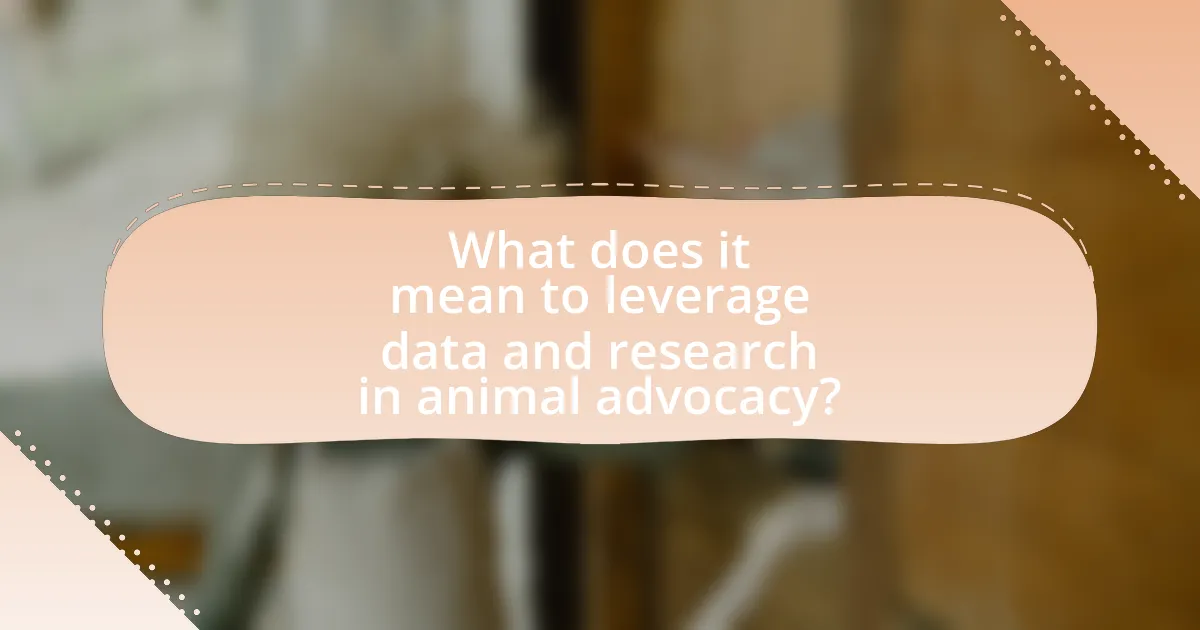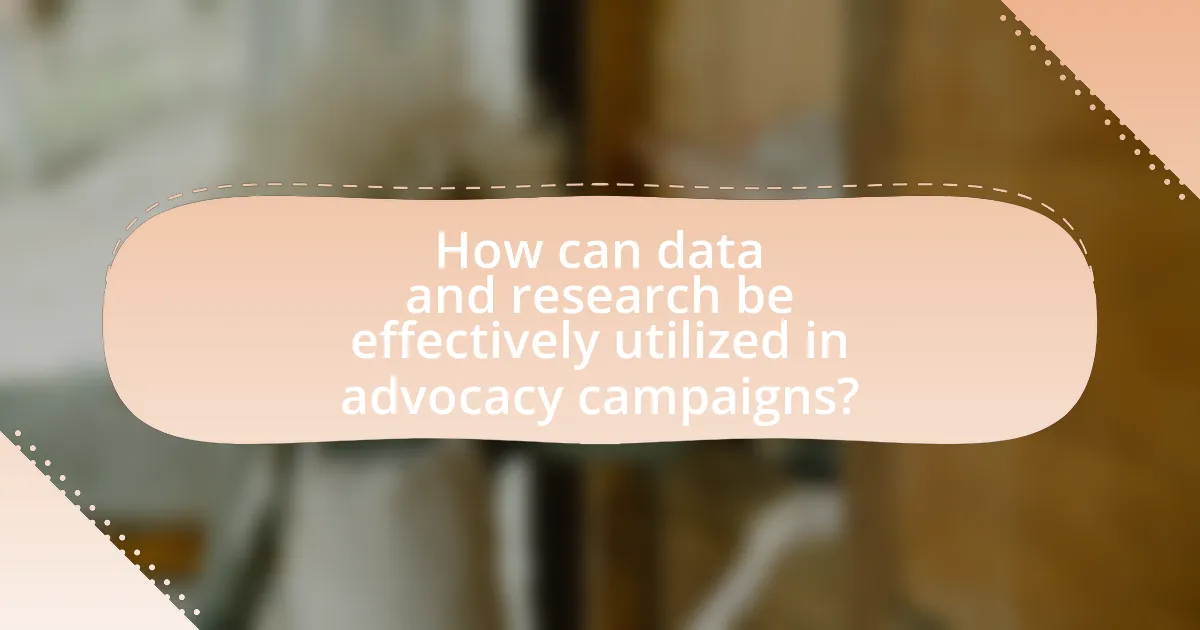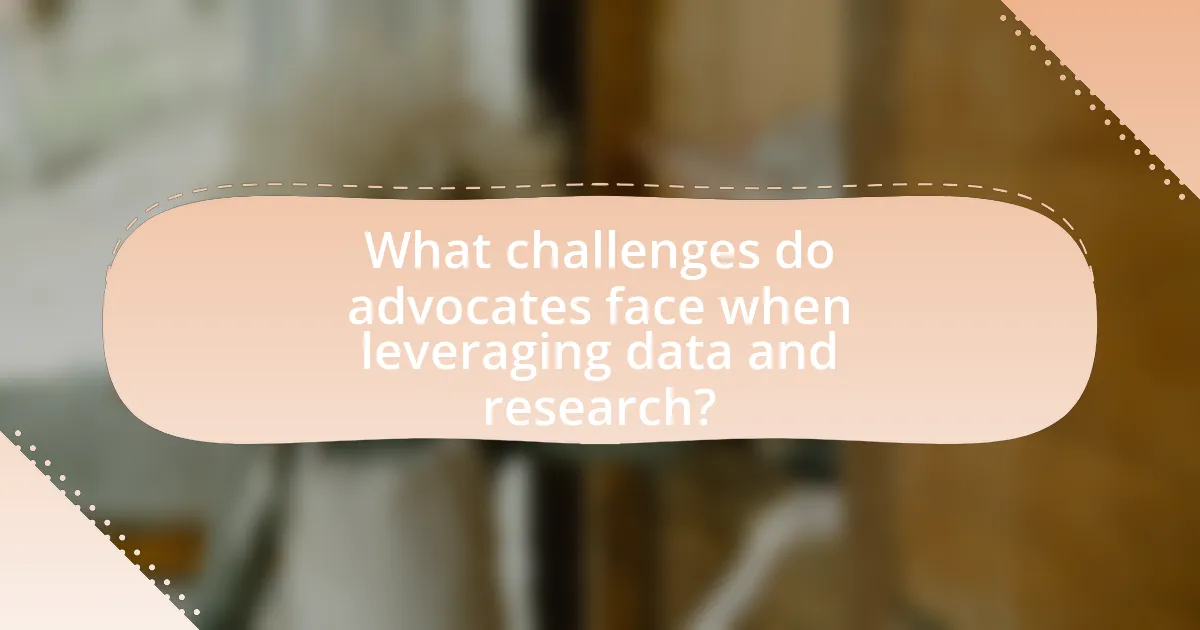Leveraging data and research is essential for strengthening animal advocacy arguments by providing empirical evidence that supports claims about animal welfare and rights. The article outlines the importance of utilizing quantitative and qualitative data, as well as case studies, to enhance the credibility of advocacy efforts and influence public perception. It discusses the role of evidence in shaping attitudes towards animal rights, the ethical considerations in data usage, and strategies for effectively presenting data in advocacy campaigns. Additionally, the article highlights the challenges advocates face in accessing and interpreting data, and offers practical tips for improving data literacy and utilizing technology in advocacy efforts.

What does it mean to leverage data and research in animal advocacy?
Leveraging data and research in animal advocacy means utilizing empirical evidence and scientific studies to support arguments for animal welfare and rights. This approach enhances the credibility of advocacy efforts by providing factual backing, such as statistics on animal suffering, environmental impacts of animal agriculture, or the effectiveness of humane alternatives. For instance, a study published in the journal “Animal Welfare” by authors such as Paul McGreevy and David Mellor highlights the importance of evidence-based practices in improving animal welfare standards. By integrating such data, advocates can more effectively persuade policymakers and the public, leading to informed decisions that benefit animals.
Why is data important for animal advocacy arguments?
Data is crucial for animal advocacy arguments because it provides empirical evidence that supports claims about animal welfare and rights. By utilizing statistics, research findings, and case studies, advocates can effectively demonstrate the impact of animal exploitation and the benefits of humane treatment. For instance, studies have shown that factory farming contributes significantly to environmental degradation, with the Food and Agriculture Organization reporting that livestock production is responsible for 14.5% of global greenhouse gas emissions. This data not only strengthens the ethical argument for animal rights but also appeals to environmental concerns, making the advocacy more persuasive to a broader audience.
What types of data are most relevant to animal advocacy?
Quantitative data, qualitative data, and case studies are the most relevant types of data for animal advocacy. Quantitative data includes statistics on animal populations, rates of animal cruelty, and the effectiveness of various advocacy strategies, which can be used to demonstrate the scale of issues and the impact of interventions. Qualitative data, such as personal stories and testimonials from individuals affected by animal welfare issues, helps to humanize the cause and engage the public emotionally. Case studies provide detailed examples of successful advocacy efforts, illustrating best practices and outcomes that can inform future initiatives. Together, these data types create a comprehensive evidence base that strengthens arguments for animal advocacy.
How can research enhance the credibility of animal advocacy claims?
Research enhances the credibility of animal advocacy claims by providing empirical evidence that supports the ethical and welfare arguments for animal rights. For instance, studies such as “The Impact of Animal Agriculture on Climate Change” published in the journal Nature by authors Joseph Poore and Thomas Nemecek demonstrate the significant environmental consequences of animal farming, thereby reinforcing claims about the need for dietary changes to protect animal welfare and the planet. Additionally, research findings from the American Psychological Association indicate that animals experience pain and suffering similarly to humans, which strengthens the moral arguments for their protection. By grounding advocacy claims in scientifically validated data, advocates can effectively persuade policymakers and the public, leading to more informed decisions regarding animal welfare legislation.
What role does evidence play in shaping public perception of animal rights?
Evidence plays a crucial role in shaping public perception of animal rights by providing factual support for claims regarding animal welfare and ethical treatment. Research studies, such as those conducted by the American Society for the Prevention of Cruelty to Animals (ASPCA), demonstrate that public awareness of animal suffering influences attitudes toward animal rights legislation. For instance, a survey by the Humane Society International found that 70% of respondents support stronger animal protection laws when presented with evidence of animal cruelty in factory farming. This data-driven approach not only informs the public but also mobilizes advocacy efforts, leading to increased support for animal rights initiatives.
How can statistics influence public opinion on animal welfare issues?
Statistics can significantly influence public opinion on animal welfare issues by providing concrete evidence that highlights the extent of animal suffering and the effectiveness of welfare initiatives. For instance, a study by the American Society for the Prevention of Cruelty to Animals (ASPCA) found that 70% of Americans support stronger animal protection laws, demonstrating a clear public sentiment towards animal welfare when backed by statistical data. Furthermore, statistics can reveal trends, such as the increase in reported animal cruelty cases, which can galvanize public support for policy changes. By presenting data on the positive outcomes of welfare programs, such as reduced euthanasia rates in shelters, advocates can effectively persuade the public to engage with and support animal welfare initiatives.
What are the ethical considerations when using data in advocacy?
Ethical considerations when using data in advocacy include ensuring accuracy, transparency, and respect for privacy. Accuracy is crucial as misleading or incorrect data can harm credibility and misinform the audience; for instance, a study published in the Journal of Animal Ethics emphasizes the importance of using reliable sources to maintain integrity in advocacy efforts. Transparency involves clearly communicating the sources and methods used to gather data, which fosters trust among stakeholders. Respect for privacy is essential, particularly when data involves individuals or sensitive information; the General Data Protection Regulation (GDPR) outlines strict guidelines for handling personal data, highlighting the need for ethical data practices. These considerations collectively ensure that advocacy efforts are responsible and effective.

How can data and research be effectively utilized in advocacy campaigns?
Data and research can be effectively utilized in advocacy campaigns by providing evidence-based support for claims, enhancing credibility, and informing strategic decisions. For instance, statistical data on animal welfare issues, such as the number of animals affected by factory farming practices, can be used to highlight the urgency of the cause. Research studies, like those published in the Journal of Animal Ethics, demonstrate the ethical implications of animal treatment, which can persuade stakeholders and policymakers. Furthermore, data analytics can identify target demographics, allowing campaigns to tailor messages that resonate with specific audiences, thereby increasing engagement and impact.
What strategies can advocates use to present data compellingly?
Advocates can present data compellingly by utilizing storytelling techniques, visual aids, and contextual framing. Storytelling engages the audience emotionally, making the data relatable; for example, sharing individual animal stories alongside statistics can create a powerful narrative. Visual aids, such as infographics and charts, simplify complex information and enhance retention, as studies show that visuals can increase understanding by up to 400%. Contextual framing involves presenting data within a relevant context, such as comparing animal welfare statistics to human welfare issues, which can resonate more deeply with the audience. These strategies collectively enhance the persuasive impact of data in advocacy efforts.
How can visual data representations enhance understanding?
Visual data representations enhance understanding by simplifying complex information, making it more accessible and interpretable. For instance, charts and graphs can distill large datasets into visual formats that highlight trends and patterns, allowing viewers to grasp key insights quickly. Research by the American Psychological Association indicates that visual aids can improve retention of information by up to 65%, demonstrating their effectiveness in communication. By presenting data visually, advocates can convey their messages more powerfully, thereby strengthening their arguments in animal advocacy.
What are best practices for citing research in advocacy materials?
Best practices for citing research in advocacy materials include using credible sources, providing clear citations, and ensuring accessibility of the information. Credible sources, such as peer-reviewed journals or reputable organizations, enhance the reliability of the advocacy message. Clear citations, formatted consistently according to a recognized style (e.g., APA, MLA), allow readers to verify the information easily. Additionally, making research accessible by summarizing key findings in layman’s terms ensures that the audience understands the implications of the data. These practices are supported by studies indicating that transparency in sourcing increases trust and engagement in advocacy efforts.
How can collaboration with researchers strengthen advocacy efforts?
Collaboration with researchers can strengthen advocacy efforts by providing evidence-based data that enhances the credibility of advocacy claims. When advocates partner with researchers, they gain access to rigorous studies and statistical analyses that can substantiate their positions on animal welfare issues. For instance, research published in the journal “Animal Welfare” demonstrates that data-driven arguments significantly influence public opinion and policy decisions, leading to more effective advocacy outcomes. By integrating scientific findings into their messaging, advocates can better persuade stakeholders and policymakers, ultimately driving meaningful change in animal advocacy.
What are the benefits of partnerships between advocates and academic institutions?
Partnerships between advocates and academic institutions enhance the effectiveness of animal advocacy by combining practical experience with rigorous research. These collaborations facilitate access to empirical data, which strengthens advocacy arguments and informs policy decisions. For instance, studies conducted by academic researchers can provide evidence-based insights into animal welfare issues, thereby equipping advocates with credible information to support their campaigns. Additionally, such partnerships can lead to innovative solutions and strategies that address complex challenges in animal advocacy, as seen in initiatives like the Human-Animal Bond Research Institute, which merges academic research with advocacy efforts to promote animal welfare.
How can advocates access and utilize existing research effectively?
Advocates can access and utilize existing research effectively by leveraging academic databases, government publications, and reputable non-profit organizations that focus on animal welfare. These resources provide peer-reviewed studies, statistical data, and case studies that can substantiate advocacy arguments. For instance, databases like PubMed and Google Scholar offer access to a wealth of scientific literature, while organizations such as the Humane Society and the ASPCA publish reports that highlight key findings relevant to animal advocacy. By synthesizing this information, advocates can craft compelling narratives and evidence-based arguments that resonate with policymakers and the public, thereby enhancing their advocacy efforts.

What challenges do advocates face when leveraging data and research?
Advocates face several challenges when leveraging data and research, primarily including data accessibility, data interpretation, and the credibility of sources. Data accessibility is often limited due to proprietary databases or paywalls, making it difficult for advocates to obtain necessary information. Additionally, interpreting complex data requires expertise that many advocates may lack, leading to potential misrepresentation of findings. Credibility of sources is another significant challenge, as advocates must discern between reliable research and biased or flawed studies, which can undermine their arguments. For instance, a study published in the Journal of Animal Ethics highlights that advocates often struggle with distinguishing peer-reviewed research from non-scientific claims, impacting their ability to present robust evidence in support of animal advocacy.
What common misconceptions exist about data in animal advocacy?
Common misconceptions about data in animal advocacy include the belief that all data is unbiased and representative, and that anecdotal evidence is sufficient for making policy decisions. Many advocates assume that data collected from specific studies can be generalized to all animal welfare contexts, which is often not the case. For instance, a study focusing on one species or region may not accurately reflect the conditions or needs of others, leading to misguided advocacy efforts. Additionally, the reliance on anecdotal evidence can undermine the credibility of arguments, as it lacks the rigor and reliability of systematic research. This misunderstanding can result in ineffective strategies that do not address the broader issues faced by animals.
How can advocates address skepticism regarding data sources?
Advocates can address skepticism regarding data sources by ensuring transparency and credibility in their data presentation. By providing clear citations, detailing the methodology used in data collection, and referencing reputable organizations or peer-reviewed studies, advocates can build trust. For instance, a study published in the Journal of Animal Ethics highlights the importance of using data from recognized institutions, which enhances the reliability of the information presented. This approach not only counters skepticism but also reinforces the validity of the arguments made in animal advocacy.
What are the limitations of data in influencing policy change?
Data has limitations in influencing policy change due to issues such as data accessibility, interpretation biases, and the complexity of policy environments. Limited access to comprehensive and high-quality data can hinder policymakers’ ability to make informed decisions. Additionally, biases in data interpretation can lead to misrepresentations of facts, affecting the credibility of the arguments presented. Furthermore, the multifaceted nature of policy issues often requires more than just data; it necessitates political will, public opinion, and stakeholder engagement, which data alone cannot address. For instance, a study by the Pew Research Center found that while data can inform public opinion, emotional narratives often drive policy changes more effectively than statistics alone.
How can advocates overcome barriers to effective data use?
Advocates can overcome barriers to effective data use by enhancing their data literacy and fostering collaboration with data experts. Improving data literacy enables advocates to understand, interpret, and utilize data effectively, which is crucial for making informed decisions and crafting persuasive arguments. Collaboration with data experts, such as statisticians or data analysts, can provide advocates with the necessary skills and insights to analyze complex datasets and derive meaningful conclusions. Research indicates that organizations that invest in training their staff on data usage see a significant increase in their advocacy effectiveness, as evidenced by a study from the Data Literacy Project, which found that 70% of organizations reported improved decision-making after enhancing data skills among their teams.
What resources are available for advocates to improve data literacy?
Advocates can improve data literacy through various resources, including online courses, workshops, and educational materials. For instance, platforms like Coursera and edX offer courses on data analysis and visualization, which are essential skills for interpreting data effectively. Additionally, organizations such as Data Literacy Project provide free resources and toolkits specifically designed to enhance data literacy among advocates. These resources often include case studies and practical examples relevant to advocacy work, reinforcing the importance of data in making informed arguments.
How can technology aid in the collection and analysis of advocacy data?
Technology aids in the collection and analysis of advocacy data by providing tools that streamline data gathering, enhance data accuracy, and facilitate complex analysis. For instance, online surveys and data collection platforms enable organizations to gather large amounts of data from diverse populations quickly, while data analytics software allows for the processing of this information to identify trends and insights. According to a 2021 report by the Pew Research Center, 79% of advocacy organizations utilize digital tools for data collection, which significantly improves their ability to make data-driven decisions. Furthermore, machine learning algorithms can analyze patterns in advocacy data, helping organizations to predict outcomes and tailor their strategies effectively.
What are practical tips for leveraging data in animal advocacy?
To effectively leverage data in animal advocacy, organizations should focus on collecting and analyzing relevant statistics to support their claims. Utilizing surveys and studies can provide insights into public attitudes towards animal welfare, which can be used to tailor messaging and campaigns. For instance, a study by the American Society for the Prevention of Cruelty to Animals (ASPCA) found that 71% of Americans consider animal welfare an important issue, highlighting the potential for advocacy efforts. Additionally, employing data visualization tools can enhance the presentation of findings, making complex information more accessible and engaging for the audience. Collaborating with researchers to publish peer-reviewed studies can also lend credibility to advocacy efforts, as evidenced by the work of the Animal Welfare Institute, which has successfully influenced policy changes through data-driven research.